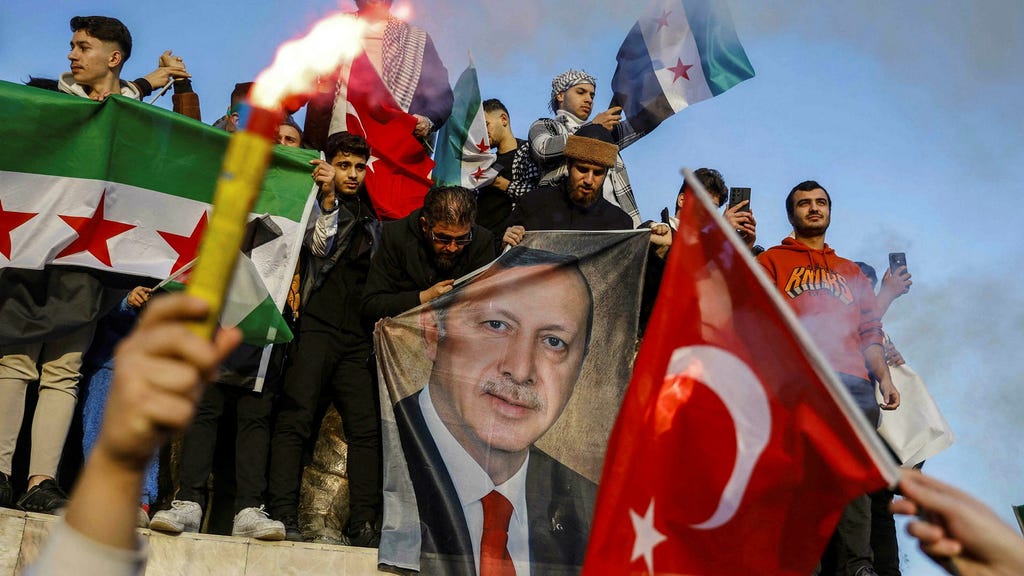The sudden collapse of Bashar al-Assad’s regime in Syria after nearly 13 years of brutal civil war has dramatically reshaped the geopolitical landscape of the Middle East, presenting Turkey with both opportunities and challenges. President Recep Tayyip Erdogan, seizing the moment, swiftly opened Turkey’s borders with Syria, facilitating the return of millions of Syrian refugees who had sought refuge in Turkey during the conflict. This move fulfills a key campaign promise made by Erdogan, bolstering his domestic political standing and potentially easing the social and economic strain caused by hosting such a large refugee population. The return of refugees, while fraught with uncertainties for the returnees given the widespread destruction of homes and infrastructure in Syria, also symbolizes a significant shift in regional power dynamics.
Turkey stands to gain considerably from the regime change in Syria. Beyond the domestic political benefits, Turkish construction companies are poised to play a leading role in the massive reconstruction efforts required to rebuild the war-torn nation. This economic opportunity could inject significant capital into the Turkish economy. More significantly, the fall of Assad weakens Turkey’s regional rivals, Iran and Russia. Iran’s ”axis of resistance,” a network of alliances across the region, is disrupted, severing its land connection to Lebanon through Syria. Russia, a staunch supporter of Assad, likely faces the loss of its valuable military bases on the Syrian Mediterranean coast. This weakens both nations’ influence in the region and provides Turkey with an opportunity to assert its own dominance.
However, the new order in Syria presents complex challenges for Turkey. The United States, while seemingly stepping back from direct involvement in the conflict as indicated by President Trump’s statements, maintains a vested interest in the region, particularly concerning the remnants of ISIS and the Kurdish forces it has partnered with in the fight against the terrorist group. The US is likely wary of the affiliations of the new Syrian leadership with radical Islamist groups like al-Qaeda, a concern voiced by Turkish Foreign Minister Hakan Fidan in discussions with US Secretary of State Antony Blinken. The US is also concerned about the potential for further destabilization and the importance of maintaining Syria’s territorial integrity, a point Fidan emphasized, though perhaps unconvincingly given Turkey’s own interventions in Syria.
Turkey’s actions in northern Syria, including the establishment of a military presence in Idlib, a province controlled by jihadist groups, and frequent attacks on Kurdish-held territories, further complicate the situation. Erdogan’s pursuit of a buffer zone against PKK-linked Kurdish forces underscores Turkey’s security concerns, but also raises tensions with the US, which views the Kurdish forces as crucial allies in the fight against ISIS. This delicate balance between competing interests and concerns requires careful navigation by all involved parties.
The evolving situation in Syria has the potential to reshape the broader regional power balance. Experts suggest that Turkey’s increased influence in Syria could translate into greater leverage in Lebanon and Iraq, further diminishing Iranian influence. This dynamic extends beyond the immediate region, with implications for the Caucasus, where Turkey and Iran have long competed for influence. Turkey’s strong support for Azerbaijan in its conflict with Armenia over Nagorno-Karabach, a conflict seen as a setback for Iran, illustrates Turkey’s growing assertiveness in the region.
The fall of the Assad regime, while presenting opportunities for Turkey, also carries significant risks. Navigating the complex web of alliances and rivalries in the region, balancing its own security concerns with the interests of other actors like the US, and managing the return of Syrian refugees will be crucial tests for Erdogan and Turkey. The possibility of further instability in Syria and the emergence of new power vacuums pose significant challenges. The long-term consequences of these developments remain to be seen, but the dramatic shift in power dynamics has fundamentally altered the geopolitical landscape of the Middle East, with Turkey poised to play a more prominent and assertive role.













